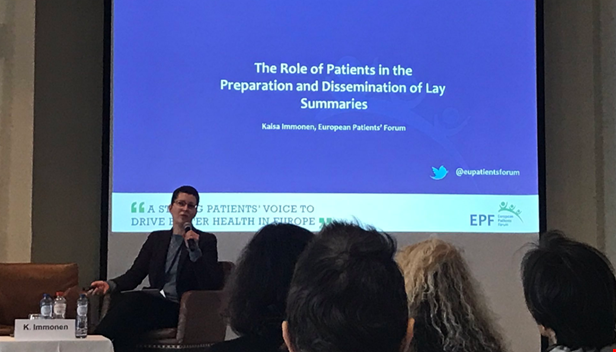Involving patients in the development and review of lay summaries: new guidance to be published in 2020

The upcoming Clinical Trial Regulation requires the development and dissemination of lay summaries of the results in all clinical trials in the EU.
Although the European Commission in 2017 released an Expert Recommendation on the content of lay summaries, there is no practical guidance on how best to handle the development process and how best to ensure reliable dissemination to increase clinical research transparency, return results to the participants of clinical trials, and enhance patients’ and the public’s understanding of clinical research.
To this end, the “Roadmap Initiative to Good Lay Summary Practices” includes participants from pharmaceutical companies, academic institutions, patient organisations, and not-for-profit organisations, which have been working together since 2017, and aims to complete their work in mid-2020.
On 15 January, a joint workshop organized by EFPIA and EFGCP on Good Lay Summary Practices presented the findings of the working group thus far, as well as addressed some existing challenges.
Firstly, having to come up with one summary which fits all the needs, emerged as a persisting challenge. The need to be efficient and transparent at the same time, not to mention accessible to both the general public and patients adds to the challenge.
Secondly, the target audience (patients and lay people) should not only be part of the reviewing, but also the developing part of the summaries – it is the only way to ensure that the summaries will be fit for purpose and give patients the information they look for. Kaisa Immonen (Director of Policy, EPF) emphasised that patient involvement in clinical trials is not just a moral requirement, it also achieves better results and return on investment. She placed patient involvement in the wide context of research, where patients should be involved much earlier in the process (for example in selecting the right research questions and deciding meaningful end points).
The use of non-promotional language, and adding user-friendly layout and design, was also discussed during the session on the dissemination of lay summaries. Non-promotional distribution methods have to adhere to ethical principles . The EU Regulation doesn’t stipulate how lay summaries can be shared, beyond publication on the EU clinical trials portal. One way to achieve more effective dissemination could be via patient organisations. The lay summaries should always be in the local language.
The workshop concluded by stressing that guidelines on how to effectively develop lay summaries are very much needed, and that the new infrastructures and processes must integrate meaningful involvement of patients. The group will submit its advanced draft to a public consultationin order to collect further feedback and finalise its recommendations before the Clinical Trials Regulation officially comes into application. Given the increased interest in clinical research among the public, the patient community should fully seize the opportunity and act to make the development of lay summaries fully patient-centric in every way possible. Publication of the results is only one part of the clinical research process, but it is a crucial one.
